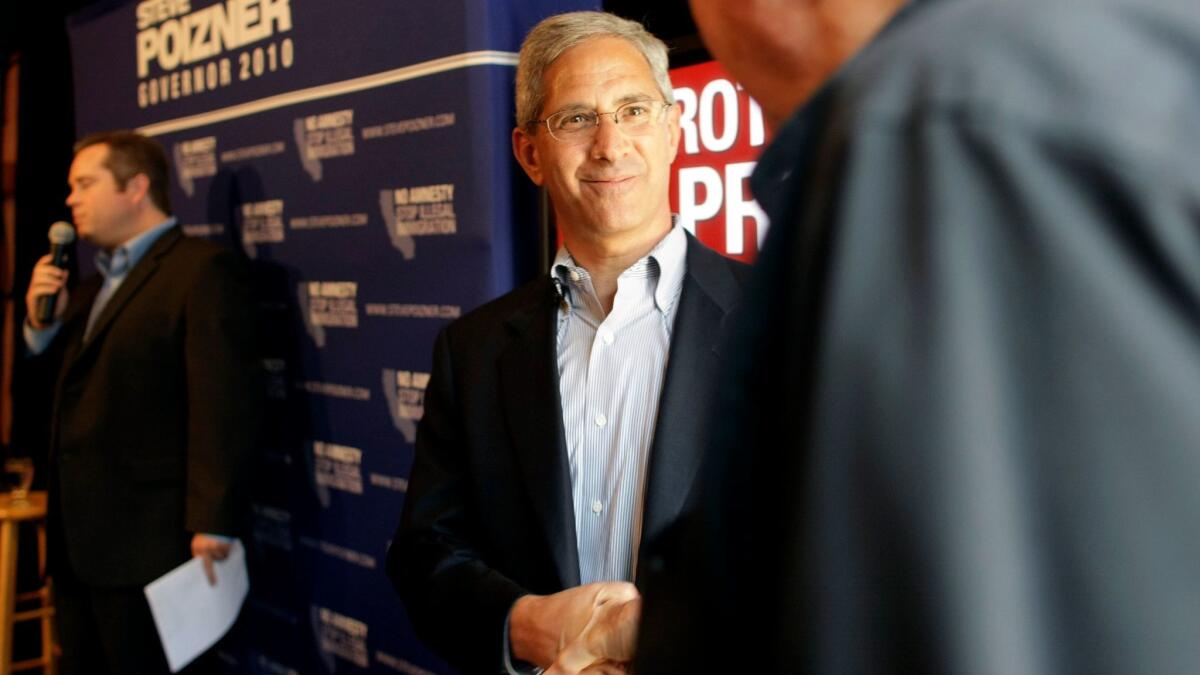He once held the job as a Republican, but now Steve Poizner is making a no-party bid for California insurance commissioner

- Share via
Reporting from Sacramento — Eight years after losing a bitter Republican primary for governor and stepping away from California’s political scene, Steve Poizner said Monday that he will run again for the elected office he gave up in that contest — state insurance commissioner.
This time, he won’t run as a Republican.
“There’s no room for partisan politics at the Department of Insurance,” Poizner said in an interview, announcing the launch of a campaign to become the first independent “no party preference” candidate ever to win statewide office.
The 61-year old former tech entrepreneur served as insurance commissioner from 2007 to 2011.
Politically speaking, Poizner is part of the answer to a lingering piece of California electoral trivia. Poizner and former Gov. Arnold Schwarzenegger were the last two Republicans to win a statewide race. In the 12 years since those victories, the GOP’s share of the state’s registered electorate has plummeted. Party loyalists have largely embraced statewide candidates with positions that polls find are to the political right of a majority of California voters.
COLUMN: It’s tough for Republicans to win in California if they don’t have candidates »
Immigration was the topic on which Poizner bet his 2010 campaign for governor. The wealthy candidate — whose GOP challenger, former Hewlett-Packard Enterprise CEO Meg Whitman, was even wealthier — insisted at the time that the only thing that could “save” California was to crack down on assistance to those in the U.S. illegally.
“As governor, I will stop taxpayer-funded benefits for illegal immigrants,” Poizner said in a TV ad that spring. He criticized these services as “magnets” that were responsible for illegal immigration — an image later invoked by Republican Mitt Romney in the 2012 presidential race, a candidate who used some of the same political strategists as Poizner.
Whitman accused Poizner, who six years earlier had cultivated a more centrist message in a failed campaign for the state Assembly, of flip-flopping on key Republican issues. He ending up losing the gubernatorial primary by almost 900,000 votes. (Whitman lost the race that fall.)
Poizner said Monday that his views on immigration have changed. “We just have to solve this problem,” he said. “We have to come up with a solution where everyone can get on a path to being documented.”
He said his 2018 campaign will focus on how to help homeowners who have too little insurance in the face of wildfire and flood dangers, as well as addressing the issues of health insurance fraud and the lack of insurance products available in the event of cyber-crime.
The Department of Insurance is touted as the state’s largest consumer protection agency. The commissioner, a position created by voters in 1988, oversees more than 1,400 employees and has a hand in considering rates charged for auto and home insurance.
Commissioner Dave Jones, the incumbent, has used the office to seek an expanded role in reviewing health insurance plans in the wake of changes brought by the federal Affordable Care Act. Poizner said he believes the Obamacare “needs to get fixed,” and that he believes health insurance fraud is a key factor in rising costs.
Jones is stepping down due to term limits and is running for attorney general. Poizner, his immediate predecessor, could serve one final four-year term if elected.
After leaving office, he started a company that helped bring educational materials to mobile devices and in 2014 sold the venture to San Diego-based Qualcomm.
He then worked for the company until 2016.
Poizner spent most of his professional life in Silicon Valley and currently is an “entrepreneur in residence” at the Rady School of Management at UC San Diego. He said he is involved, too, with a nonprofit that is seeking to bring Southern California “on par” with tech communities to the north.
So far, the race for insurance commissioner has looked to be a clash of Democrats between state Sen. Ricardo Lara (D-Bell Gardens) and San Gabriel Valley pulmonologist Dr. Asif Mahmood. The only other expected candidate is Bay Area insurance agent Peter Kuo, a Republican. The formal filing period for elected offices began on Monday and lasts through early March.
Poizner insisted he will campaign as an unaffiliated “no party preference” candidate, and said he changed his registration from Republican a few weeks ago. As he said in his 2006 campaign, he believes the job of insurance commissioner should officially be non-partisan, a person who can be “fiercely independent of the insurance industry and party politics.”
In the only existing statewide non-partisan job, superintendent of public education, candidates are often associated with a political party. The current superintendent, Tom Torlakson, is a registered Democrat. And Poizner says he remains supportive of many Republican principles. He donated money to and served as a national co-chairman for Ohio Gov. John Kasich’s presidential campaign in 2016.
There are more than 4.7 million California voters who cite “no party preference” on their registration. But no candidate in the modern era has won a statewide election without a partisan political campaign.
Poizner, who spent $24 million in his unsuccessful race for governor eight years ago, said he will raise money from donors (though not the insurance industry) for this race. And he said he realizes the challenge of a political comeback after the hard-fought races of the past.
“I have definitely not picked an easy path,” he said. “There are no shortcuts here in what I’m trying to do.”
Follow @johnmyers on Twitter, sign up for our daily Essential Politics newsletter and listen to the weekly California Politics Podcast.
ALSO:
Updates on California politics
More to Read
Get the L.A. Times Politics newsletter
Deeply reported insights into legislation, politics and policy from Sacramento, Washington and beyond. In your inbox three times per week.
You may occasionally receive promotional content from the Los Angeles Times.











